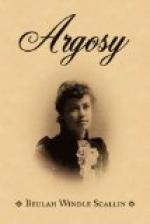“I do not mind how often I am awakened in the same way,” I said. “No one has ever seemed to love me but you, and I cannot help loving you back.”
“My poor child!” was all she said. We had sat down by this time close to the window, and Sister Agnes was holding one of my hands in hers and caressing it gently as she gazed dreamily across the park. My eyes, child-like, wandered from her to the room and then back again. The picture still lives in my memory as fresh as though it had been limned but yesterday.
A square whitewashed room, fitted up with furniture of unpolished oak. On the walls a few proof engravings of subjects taken from Sacred History. A small bookcase in one corner, and a prie-dieu in another. The floor uncarpeted, but polished after the French fashion. A writing-table; a large workbox; a heap of clothing for the poor; and lastly, a stand for flowers.
The features of Sister Agnes were as delicate and clearly cut as those of some antique statue, but their habitual expression was one of intense melancholy. Her voice was low and gracious: the voice of a refined and educated gentlewoman. Her hair was black, with here and there a faint silver streak; but the peculiar head-dress of white linen which she wore left very little of it visible. Disfiguring as this head-dress might have been to many people, in her case it served merely to enhance the marble whiteness and transparent purity of her complexion. Her eyebrows were black and well-defined; but as for the eyes themselves, I can only repeat what I said before—that their dark depths were full of tenderness and a sort of veiled enthusiasm difficult to describe in words. Her dress was black, soft and coarse, relieved by deep cuffs of white linen. Her solitary ornament, if ornament it could be called, was a rosary of black beads. Not without reason have I been thus particular in describing Sister Agnes and her surroundings, as they who read will discover for themselves by-and-by.
Sister Agnes woke up from her reverie with a sigh, and began talking to me about my schooldays and my mode of life at Park Hill Seminary. It was a pleasure to me to talk, because I felt it was a pleasure to her to listen to me. And she let me talk on and on for I can’t tell how long, only putting in a question now and again, till she knew almost as much about Miss Chinfeather and Park Hill as I knew myself. But she never seemed to grow weary. We were sitting close together, and after a time I felt her arm steal gently round my waist, pressing me closer still; and so, with my head nestling against her shoulder, I talked on, heedless of the time. O happy afternoon!
It was broken by a summons for Sister Agnes from Lady Chillington. “To-morrow, if the weather hold fine, we will go to Charke Forest and gather blackberries,” said Sister Agnes as she gave me a parting kiss.
That night I went early to bed, and never woke till daybreak.




